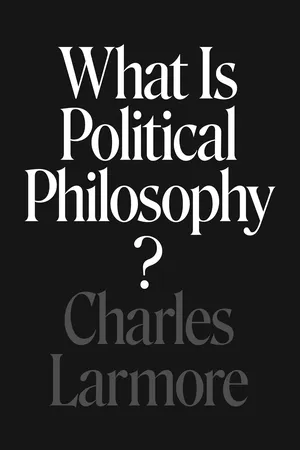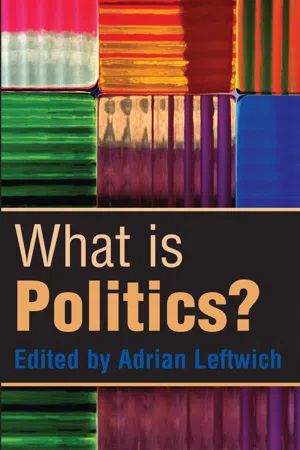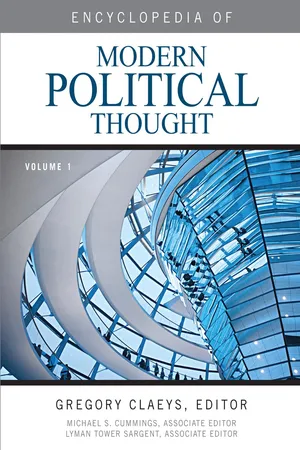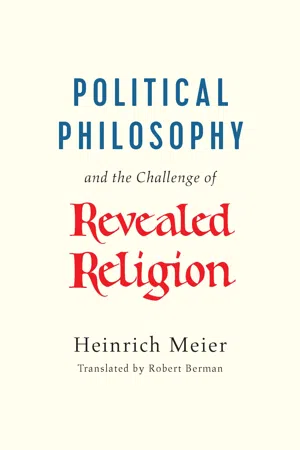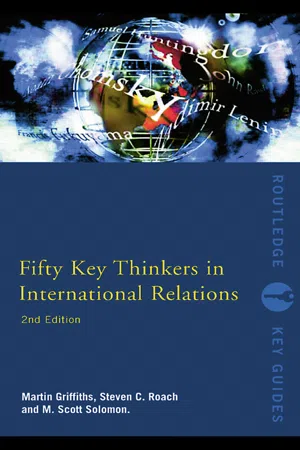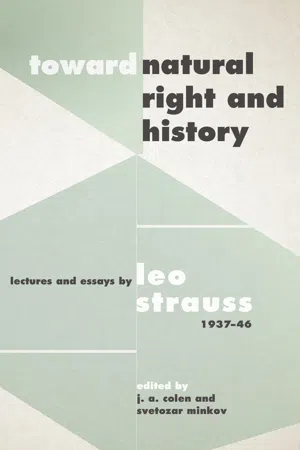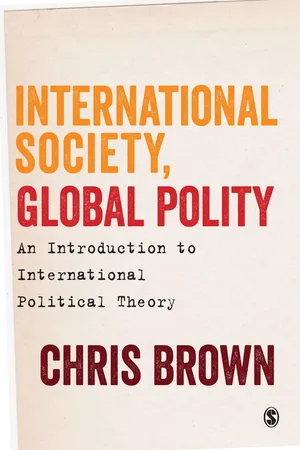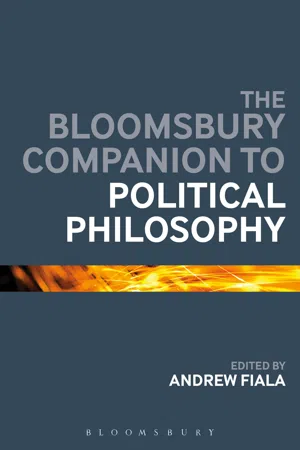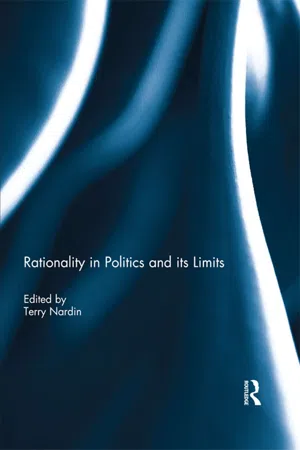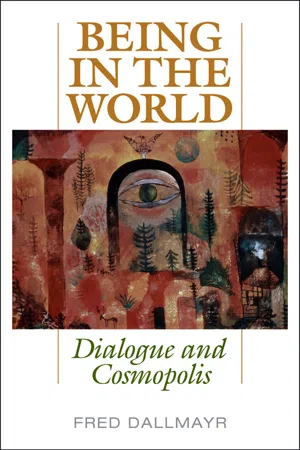Politics & International Relations
Political Philosophy
Political philosophy is a branch of philosophy that explores the fundamental questions about power, justice, rights, and the nature of government. It seeks to understand and analyze political concepts and institutions, as well as the ethical and moral principles that underpin them. Political philosophers examine the nature of political authority, the best forms of government, and the rights and responsibilities of citizens.
Written by Perlego with AI-assistance
Related key terms
Related key terms
1 of 4
Related key terms
1 of 3
12 Key excerpts on "Political Philosophy"
- eBook - ePub
- Charles Larmore(Author)
- 2020(Publication Date)
- Princeton University Press(Publisher)
1
The Relation between Political and Moral Philosophy
THE QUESTION IN the title of this book receives much less attention than it deserves. Too often the domain of Political Philosophy is defined by a series of classic texts (running from Aristotle’s Politics , through Hobbes’s Leviathan , to Rawls’s A Theory of Justice ) along with a conventional list of the topics to be addressed—the acceptable limits of state action, the basis of political obligation, the virtues of citizenship, and the nature of social justice. Precisely this last topic, however, shows why the question “What is Political Philosophy?” ought to have a greater urgency. For justice is a topic that also belongs to moral philosophy. How, therefore, are moral philosophy and Political Philosophy to be distinguished? Both take as their subject the principles by which we should live together in society. How exactly do they differ? If justice—to invoke a traditional tag as indisputable as it is uninformative—means giving everyone his or her due (suum cuique ), then what is it to fill in the import of this phrase as a moral philosopher and to do so instead from the standpoint of Political Philosophy?These questions are not motivated by a general love of intellectual hygiene. I do not assume that the various areas of philosophy need always to be cleanly demarcated from one another in order to avoid contamination by alien concerns and influences. Rather, disciplines arise in response to problems, and the boundaries between them, when justified, reflect the extent to which they deal with different problems or handle what might seem to be similar problems from fundamentally different perspectives. Now Political Philosophy—to invoke what may also look like a vacuous definition—consists in systematic reflection about the nature and purposes of political life. The relation it has to moral philosophy depends therefore on how political philosophers, in tackling this subject, should position themselves with respect to the sphere of morality. There have been, broadly speaking, two competing conceptions. - eBook - ePub
What is Politics?
The Activity and its Study
- Adrian Leftwich(Author)
- 2015(Publication Date)
- Polity(Publisher)
9Political Philosophy and PoliticsAdam Swift1 Introduction and Argument
Political philosophers offer no single answer to the question of what politics is. This is not very surprising, since they do not agree about what philosophy is either. Different kinds of philosopher treat issues in quite different ways, seeking different kinds of answer to different kinds of question. Some value analytical precision, absolute clarity of expression, and logical rigour. Others regard such virtues as inappropriately scientific and adopt a more literary or artistic approach. Some put the history of philosophy at the centre of the discipline. Others think that the important questions can be addressed without any historical input. This variety means that any attempt to explain how ‘Political Philosophy’ conceptualizes politics is bound to be biased, reflecting the particular views of the person doing the explaining. What follows, then, is not the answer to the question of how Political Philosophy thinks about politics, it is just an answer: quite a widely shared answer, to be sure, and an answer that has come to exert considerable influence over the way Political Philosophy is done in many parts of the world. But, still, there are many who would take a very different line.Here, in summary, is the view: politics is concerned specifically with the state. And Political Philosophy asks whether there should be a state, how it should act, what moral principles should govern the way it treats its citizens and what kind of social order it should seek to create. As those ‘shoulds’ suggest, it is a branch of moral philosophy, interested in justification, in what the state ought (and ought not) to do. But the state, as political philosophers think about it, is not – or should not be – something separate from and in charge of those who are subject to its laws. Rather it ought to be the collective agent of the citizens, who decide what its laws are. So the question of how the state should treat its citizens is that of how we, as citizens, should treat one another. The state is a coercive instrument. It has various means – police, courts, prisons – of getting people to do what it says, whether they like it or not, whether they approve or disapprove of its decisions. Political Philosophy, then, is a very specific sub-set of moral philosophy, and one where the stakes are particularly high. It is not just about what people ought to do, it is about what people are morally permitted, and sometimes morally required, to make each other do. - eBook - ePub
- Gregory Claeys(Author)
- 2013(Publication Date)
- CQ Press(Publisher)
The positions advanced from these three perspectives can all be combined in various ways. But this broad band of possible appeals to order—object v. subject, stability v. instability, passive v. active—must be read off more as principles than as autonomic or psychological “drives” or “instincts.” The various political, philosophical, religious, ethical, and ideological orders displayed in human associations (code-switching, mimesis) would be confined to a much narrower spectrum were they merely “natural,” viz. directly imposed by nature.Reference and Homologues
Political Philosophy attends to right conduct towards the individual, society, state, global community, and environment. Human populations grow and spread, the natural environment tacks and turns, socio-political organization transitions and mutates. Correspondingly, Political Philosophy evolves in ways ever more complex—permeating university departments under numerous appellations. Social theory is addressed in sociology, legal and jurisprudential theory in law, leadership theory in business studies and administration, applied ethics in philosophy, public policy in political science (political studies) and economics, and so on. The hard core of the subject (sense) persists, the conditions to which it applies (reference) spatter like raindrops in a storm.Confining attention to the academic study of political science or political studies, Political Philosophy, in its core aspects—normative, factual (historical and ontological), and analytical—is imperfectly shadowed by the terms (1) political theory, (2) political thought, and (3) political ideology.1. Political Theory
a. Political theory - Heinrich Meier, Robert Berman, Robert Berman(Authors)
- 2017(Publication Date)
- University of Chicago Press(Publisher)
Although Political Philosophy, as far as its subject matter is concerned, makes up merely a part of philosophy, it by no means has a narrowly circumscribed segment of human life as its object. Nor do we meet in this object, say, an autonomous domain of life that exists alongside a number of autonomous domains of life or “provinces of culture” of equal rank. The central questions of Political Philosophy, the questions of the best political order, of the right life, of just rule, of the necessary weight of authority, knowledge, and force, can be properly raised only in conjunction with those other questions of the nature of man, of his place between beast and God, of the abilities of the human mind, the capacities of the human soul, and the needs of the human body. The object of Political Philosophy is thus the human things in the comprehensive sense, and the questions of Political Philosophy all lead back to a question that is posed to man as man: the question of what is right. If he wishes to answer it seriously, if he seeks to gain clarity for himself, he finds himself faced with conflicting claims. He is subject to the law of the political community, the commandment of God or of men, and he meets with answers that are advanced with the demand for obedience or with the will to enforcement. The question of what is right is posed to man, in other words, in the sphere of the political- eBook - ePub
- Martin Griffiths, Steven C. Roach, M. Scott Solomon(Authors)
- 2008(Publication Date)
- Routledge(Publisher)
INTERNATIONAL POLITICAL THEORY/INTERNATIONAL ETHICS International political theory is a normative theory that focuses on international ethics and foundational political problems. The extension of political theory to the international realm represents a longstanding tradition, but in this case it can be traced to Charles Beitz’s International Political Theory, which for many remains the founding text of this subfield. International political theory focuses on a number of thematic areas of study, including justice, global distribution of resources, equal respect, just war theory, universal human rights, political freedom, peace and political responsibility. Ethics, for instance, can be broken down into three categories: meta-ethics, which studies moral judgement; normative ethics, or what makes a judgement right or wrong; and applied ethics, which analyse conduct in particular circumstances. International political theory also encompasses a broad range of theoretical perspectives and approaches, including cosmopolitanism, communitarianism, critical theory, sociological theory and even postmodern theory. Cosmopolitanism remains the prevalent school of international political theory, accounting for a wide range of political theoretical analyses of global ethics and responsibility. Still, the marriage between international and political theory has not been easy. Tensions between international political theorists and political theorists remain, the most well known example being the debate between Beitz and Rawls. John Rawls, for instance, never accepted Beitz’s formulation of a global original position. In fact, in The Law of the Peoples Rawls adopted a realist utopian view that was based on the fundamental difference between cosmopolitan principles and state sovereignty. The Law of Peoples, however, has helped reignite debate about what it means to theorize about international justice and ethics - eBook - ePub
Toward "Natural Right and History"
Lectures and Essays by Leo Strauss, 1937–1946
- Leo Strauss, J. A. Colen, Svetozar Minkov(Authors)
- 2018(Publication Date)
- University of Chicago Press(Publisher)
The situation in Political Philosophy is not fundamentally different from that in the other branches of philosophy. Philosophy means the attempt, constantly renewed, to find the truth; the very term philosophy implies that we do not possess the truth. Philosophy is at best possession of clear knowledge of the problems —it is not possession of clear knowledge of the solutions to the problems. The basic questions in all branches of philosophy are as unsolved today as they were at all times; new questions have been raised from time to time; the interest has shifted from one type of questions to others; but the most fundamental, the truly philosophic questions remain unanswered. This is, of course, no objection to philosophy as such: but it is an objection to the expectation, or the claim, that philosophy is a safe guide for action. One may try, and people did try, to seclude from the realm of philosophy the questions which do not seem to permit of a universally acceptable answer, but in doing so, one is merely evading the questions, not answering them. I have been trying to remind you of that melancholy spectacle called the anarchy of the systems, a phenomenon which is almost as old as philosophy itself and which seems to have so profound roots in the nature of philosophy and of its objects that it is reasonable to expect that it will last as long as philosophy itself. That spectacle becomes perhaps even more melancholic if one considers political or social philosophy by itself. 34 One could take almost any fundamental question of Political Philosophy, and one could show that no answer exists which is universally accepted by honest seekers of the truth, to say nothing of the partisans of the various camps. (E.g., is justice of the essence of the State?) 35 2. But even if we could be reasonably certain that a given Political Philosophy is the true Political Philosophy, one could say that one cannot learn anything important from it as far as political action is concerned - eBook - ePub
International Society, Global Polity
An Introduction to International Political Theory
- Chris Brown(Author)
- 2014(Publication Date)
- SAGE Publications Ltd(Publisher)
Realist International Relations theorists tell us that international politics is about states, power and interest and there is no reason to believe that this is not the case, but one of the founding principles of all the different variants of International Political Theory that will be examined in this book is that this is not the whole story. International politics is also about values and norms, and states are not always the most significant international actors. Another belief of International Relations theorists – this time liberal as well as realist – is that the discipline of International Relations is a twentieth-century construct, generated by the two World Wars. Again practitioners of International Political Theory do not deny that as a university discipline, International Relations emerged after 1918, and re-emerged, revitalised after 1945, but they also hold that thinking about topics that we now call ‘international’ has a long and deep history. Conventional International Relations theorists acknowledge the existence of a few forerunners to their discourse – Thucydides, Machiavelli, perhaps Hobbes and Kant – but International Political Theory draws on a much wider intellectual constellation, including many thinkers who are not obviously ‘international’ as that term has come to be understood in modern times (Brown et al., 2002). To summarise these differences, for International Relations scholars, their discipline is either a sub-field of contemporary Political Science (the dominant American view) or a cross-disciplinary focus informed by history, philosophy and law (the characteristic British view) but for International Political Theory, the study of the international is an exercise in Applied Political Philosophy. Just what kind of an exercise is the subject matter of this book, and this introductory chapter is designed to set the scene for what is to come, expanding these programmatic statements, clearing away some misunderstandings and confusions, and identifying key issues.The normative framework of international relations
International Political Theory focuses on the normative framework within which international relations takes places. This involves some quite complex ideas but, and this cannot be stressed too often, it also involves getting down and dirty with the messy reality of international politics. There is obviously the potential for disjuncture here between the more high-flown realms of discourse and the very down to earth detail of day-to-day international relations, but part of the task of the international political theorist is not to allow a gap to emerge here, or at least not to allow it to become so wide that it distorts our understanding of either theory or the world. This will sound very abstract to the newcomer to the subject, so in the next few paragraphs one or two illustrations of the ways in which the normative framework of international relations both raises deep questions and impinges on the real world will be offered. In each case the short discussion offered here is a kind of taster for what will come later because all of the topics raised will be considered at much greater depth in later chapters. - eBook - ePub
- Andrew Fiala, Andrew Fiala(Authors)
- 2015(Publication Date)
- Bloomsbury Academic(Publisher)
History has an essentially contradictory nature. We may write history after we have lost something, as Acton suggested, or in order to lose it, as Goethe suggested (Goethe, 1904, 158). The historian may bury the past by writing about it, but he may also bring it back to view. This is why the philosopher is never sure whether the historian is his friend or his enemy. The historian may be Brutus to his Caesar, but he may also be Jesus to his Lazarus. The consequence of this extreme indeterminacy is that there is no way to legislate for the history of Political Philosophy which cannot be immediately contradicted. In this chapter, therefore, I seek not to legislate for it, but instead to clarify some of its constitutions, conditions, and contradictions. The first thing to observe is that each of its three substantive terms—“history,” “politics,” “philosophy”—is contested.Politics, before the twentieth century, was always subjugated to something else—to the polis , or to empire, church, or state. But in the twentieth century, there were attempts to define politics (or the category of “the political”) as something in itself. This was evident in classic works like Schmitt’s Concept of the Political , Collingwood’s New Leviathan , Arendt’s The Human Condition , Oakeshott’s On Human Conduct , and even in more quixotic works like Badiou’s Metapolitics and Rancière’s Dis-Agreement . The consensus now, however, seems to be that politics has no simple meaning: it can mean more or less anything (Alexander, 2014). In the last half century or so, almost everything has become subject to what we could call the last laugh of Protagoras—the possibility that everything is relative, that there is nothing true about politics. It is in this situation that we attempt to make sense of politics in historical or philosophical terms, or both.Philosophy is, I have argued elsewhere, any attempt to respond to the world, or any part of it, in terms of wonder, faith, doubt, or skepticism (Alexander, 2012). It is, of course, a rather high specification for thought: it appears to exclude ordinary thought, while being related to it. I think we have to admit that Political Philosophy cannot always be very securely distinguished from political theory or political thought. When they are distinguished it is usually on the grounds that political thought includes any judgment, no matter how fragmentary or incoherent (e.g. “Legislate!”), that political theory is something more ordered so it includes justifications of certain ideas used in politics (e.g. “Liberalism”), and that Political Philosophy is something further narrowed and intensified so it includes all attempts to understand and explain what politics is and where it stands in relation to other human concerns (e.g. Leviathan ). It would be a mistake to distinguish them too severely: to only suppose, say, that ideas do not matter in politics, or that ideas matter in politics only in terms of what purposes they serve, or that ideas are only of significance when they enable us to understand politics without regard to purpose. But if the three were blurred together without argument, then we would be unable to distinguish prescription, justification, and explanation. There would be no distinction between “We should do this,” “We should do this for this set of reasons,” and “We say ‘We should do this for this set of reasons’ for this - eBook - ePub
Virtuous Imbalance
Political Philosophy between Desirability and Feasibility
- Francesca Pasquali(Author)
- 2016(Publication Date)
- Routledge(Publisher)
A Theory of Justice presents Political Philosophy as an enterprise committed to providing practical guidance. By relying on the idea that, far from offering publicly shareable criteria, philosophy is likely to prove divisive and, hence, ineffective in supplying viable political solutions, political philosophers embracing the Rawlsian paradigm, and Rawls himself, come to suggest Political Philosophy should abandon philosophy.It is possible to hint at two further reasons why, in the second half of the twentieth century, political thinkers tend to reject philosophical commitments. First, attempts to dismiss philosophy are motivated not by philosophy’s divisiveness, but, on the contrary, by its purportedly enclosing character. Philosophy’s supposed aspiration to propose ultimate and univocal solutions to be applied to politics aliments the worry that a philosophical approach is likely to display a despotic character toward politics.16 Second, philosophical approaches to politics are questioned since, due to its alleged aspiration at disclosing truth, philosophy is depicted as unsuitable to effectively answer to urgent political questions and, therefore, as liable to result practically and politically inconclusive. Richard Rorty endorses a similar position: he shares the worries just mentioned concerning philosophy’s divisiveness and its improperly despotic character and he combines them with specifically pragmatic concerns.16 This point will be addressed in section 7.4 .Rorty straightforwardly states that ‘the best hope for philosophy is not to practice Philosophy’ (Rorty 1982 : xv). According to Rorty, Philosophy with capital P – namely philosophy intended as a discipline that pursues Truth and that strives for establishing foundations for moral principles and political institutions – should shine away and let the stage to what he calls edifying philosophy. Instead of arguments, an edifying philosophy offers ‘satires, parodies, aphorisms’ (Rorty 1979 : 370) and ‘aims at continuing a conversation rather than at discovering truth’ (Rorty 1979 : 373). More precisely, Philosophy should leave the stage to a post-Philosophical culture. Rorty correctly signals that ‘the really exasperating thing about literary intellectuals, from the point of view of those inclined to science or to Philosophy, is their inability to engage in such argumentation – to agree on what counts as resolving dispute, on the criteria to which all sides must appeal’ (Rorty 1982 : xli). He also claims that, ‘in a post-Philosophical culture, this exasperation would not be felt’ since, ‘in such a culture, criteria would be seen as the pragmatist sees them – as temporary resting-places constructed for specific utilitarian ends’ (Rorty 1982 : xli). Therefore, according to Rorty, ‘on the pragmatist account, a criterion (what follows from the axioms, what the needle points to, what the statute says) is a criterion because some particular social practice needs to block the road of inquiry, halt the regress of interpretations, in order to get something done’ (Rorty 1982 : xli). This kind of pragmatic approach, which rejects philosophy’s habit of advancing, exchanging and discussing arguments for the sake of having things done, is perfectly in line with the idea that Political Philosophy should not be concerned with investigating or vindicating the theoretical correctness of its theses, but only with their practical relevance. Not surprisingly, Rorty also blurs the distinction between factual and normative domains. For instance, he asserts that ‘there is no epistemological difference between truth about what ought to be and what is’ (Rorty 1980 - eBook - ePub
- Terry Nardin(Author)
- 2017(Publication Date)
- Routledge(Publisher)
2 Who could possibly disagree with realism? Well of course, the right response is that it depends upon what the reference to realism involves. Is it a metaphysical claim about the nature and ontology of values? Or is it a practical claim about the character and object of enquiry? What political theory does not have, but which its sister sub-discipline of international relations does, is a clear target in the form of realism. Apart from its very early years, when international relations was more akin to what is now often practiced as Peace Studies, the subject has functioned with an idea of realism as its default position. The type of realism deployed in international relations has varied from classical to neo-realist positions and has drawn on classical political theories, such as those of Machiavelli or Hobbes, historical studies and more recently game theory and other formal models of political behaviour. Despite being the default position of international relations, realism and realist accounts of world politics have by no means been accepted as true. Much international relations theory, and all of what is now described at international political theory, has challenged the realist paradigm for explaining and justifying international action (see Brown 2002). But at least international relations have the advantage over Political Philosophy, in possessing some clear sense of what the virtues or problem of realism is. Political philosophers do not have a clear default position or common enemy when confronting the realist challenge. Political scientists might challenge Political Philosophy with being unrealistic or idealistic, but that is not really the point. Those who claim that Political Philosophy has some kind of realism deficit are not arguing that it should be replaced by a more empirically rooted political science, or if that is the case, they tend to disguise the claim. For philosophers such as Geuss, it is pretty clear that positive political science fares no better than the supposedly applied ethics approach of normative Political Philosophy. If John Rawls is the problem, then it is pretty clear that Norman Schofield, Ken Shepsle, Gary King or Adam Przeworski do not offer the solution.The perspective of international relations is different from that of Political Philosophy. In the former the nature and problem of realism is at the heart of the subject, whereas for Political Philosophy it is much less clear what the issue of realism is, and whether the many references to it actually have a common referent. A system of mutually antagonistic states with discrete interests competing for advantage over scarce resources explains why the realist’s default position in international relations is one of pervasive conflict or the permanent threat of war. It would be a considerable stretch of the imagination to claim that many serious political scientists believe that the background condition of politics is similarly one of persistent mortal conflict. Yet is this what is being claimed by political philosophers who have fallen under the spell of realism?One of the propositions I want to defend is that there is a surprising similarity between the claims of many classical realists in international relations and those of at least some realists in Political Philosophy. The one obvious difference is the absence of a states system as the main object of enquiry, but perhaps even that seemingly significant difference can be finessed. As we shall see, the idea of ‘modus vivendi’ does extend a similar view of group conflict and hostility into the realm of political compromise and the justification of norms. I do not intend to claim that there is a causal connection between classical realist theories in international relations and the appeal to realism in Political Philosophy, although I suspect that such a case could be made. An adequate history of British political thought in the twentieth century would explore the connections between a generation of philosophers, such as Stuart Hampshire and Isaiah Berlin, whose experience of the breakdown of appeasement in the interwar period parallels that of critics of the idealism of interwar international relations, such as E.H. Carr. The relations are complex and indirect, but they nevertheless have a bearing on the culture of post-war moral and Political Philosophy and its self-understanding. What does seem to be the case is that the supposed attraction of realism in Political Philosophy is derivative of the attractions of realism in international relations at least in its British variant. - eBook - ePub
Truth and Tragedy
Tribute to Hans J. Morgenthau
- Kenneth Thompson(Author)
- 2020(Publication Date)
- Routledge(Publisher)
Is the story of a contest between two schools that differ fundamentally in their conceptions of the nature of man, society, and politics. One believes that a rational and moral political order, derived from universally valid abstract principles, can be achieved here and now. It assumes the essential goodness and infinite malleability of human nature, and blames the failure of the social order to measure up to the rational standards on lack of knowledge and understanding, obsolescent social institutions, or the depravity of certain isolated individuals and groups. It trusts in education, reform, and the sporadic use of force to remedy these defects.This school, of course, is made up of political idealists, who stand in opposition to the other school of political realists who espouse the beliefs outlined by Morgenthau in Politics Among Nations. The theoretical quarrel, then, among students of international relations is about the purposes, the realities, and the practices of politics at the international level. It is about what politics should be like and what politics is like, between those who believe the world can be changed into what it should be and those who recognize it for what it is. And it revolves around the demands made on politicians by students, observers, and philosophers on the one hand and the behavior patterns and goals of practitioners of politics on the other.In Chicago the same dichotomy has traditionally existed between those who want the city’s political and governmental systems to solve broad social problems and those who conceive of the political function as one of “managing conflict,” in the words of Edward C. Banfield and James Q. Wilson. On one side stands the reform movement in the city, led by middle-class intellectuals whose goals range from “seeking to make democracy work and improving the quality of life in our society” by implementing a “program of good government and progressive legislation through political action,” to “bringing about not only occasional victories but complete reform in Chicago politics,” according to their literature. On the other side in the arena stands “The Machine,” made up of practicing professional politicians led by former Mayor Richard J. Daley, whose concept of the realities of political life in Chicago was best expressed by former Alderman Mathias (Paddy) Bauler on the occasion of Daley’s ascent to the mayoralty of the city in 1955. “Chicago,” declared Bauler, commenting on Daley’s victory, “ain’t ready for reform.” The Chicago machine, which traditionally has been regarded by most reformers (idealists) as an anachronism, has survived nearly half a century as a model of successful practical politics, long after all other big city machines have collapsed or disintegrated. Why has it survived and prospered? It is the thesis of this essay that an examination of the philosophical foundations and political practices of the machine politicians in Chicago will validate the legitimacy of Morgenthau’s theory of political behavior as it is expressed in Politics Among Nations. - eBook - ePub
Being in the World
Dialogue and Cosmopolis
- Fred Dallmayr(Author)
- 2013(Publication Date)
- The University Press of Kentucky(Publisher)
5. Ethics and International PoliticsA ResponsePeace cannot be kept by force; it can only be achieved by understanding. —Albert EinsteinIt is a privilege and a pleasure to respond to my colleagues and friends.1 It is a privilege because my colleagues are distinguished practitioners in their respective disciplines. It is a pleasure because reading their papers has broadened my horizons and responding to them enhances my critical self-understanding. My colleagues pose to me different questions and approach my work from different angles. However, if I am not mistaken, I perceive in their papers a common theme or thematic fabric that links them together: the theme of “ethics and international politics” (broadly construed). What leads me to this assumption or perception is my understanding of both “ethics” and “international politics” (which I trust is not entirely idiosyncratic). By ethics I mean a certain endeavor of self-opening or self-transcendence: a transgression of selfish egotism that happens best in dialogue—dialogue with oneself, with others (and, if you will, with the “Other”). By international politics or relations I mean a transgression of the bounds of national self-identity, that is, a transnational or cross-cultural engagement with other societies, political agendas, and traditions. Thus, in a rudimentary and purely intuitive sense, one might say that ethics and the international domain are not alien to each other but rather linked by a bridge that is already there.Looked at from this angle, the various paths pursued in my writings are not randomly disjointed but exhibit a certain elective affinity—I mean the paths of dialogue, hermeneutical understanding, comparative political theory, and cosmopolitanism. Of course, the more precise contours have to be fleshed out. Richard Shapcott’s essay clearly sees and articulates the connectedness of my endeavors. His main focus is on my engagement with Gadamer’s philosophical hermeneutics and on the resulting trajectories of comparative theorizing, bridge-building, and cosmopolitanism. As he notes, my central aim has been “to practice philosophical hermeneutics,” which means to put the latter to work in various contexts. In terms of intellectual bridge-building, this aim has spawned first of all the effort to explore “complementarities” among critical theory (Frankfurt), phenomenology and hermeneutics (Freiburg/Heidelberg), and Parisian post-structuralism; somewhat later, the effort was extended to East-West relations, that is, the comparison of Western traditions of thought with traditions prevailing in South Asia (India), East Asia, and also West Asia (Islam). Quite naturally, these inquiries brought me into close contact with practitioners in the areas of comparative philosophy and comparative religious studies—a contact that was deepened by my participation in several meetings of the East-West Center in Hawaii and also by my regular attendance at the annual gatherings of the Society for Asian and Comparative Philosophy (SACP). Inspired by these meetings, the idea arose to launch the project of a “comparative political theory/philosophy,” with the deliberate intent of transgressing traditional Western-centric canons of study.
Index pages curate the most relevant extracts from our library of academic textbooks. They’ve been created using an in-house natural language model (NLM), each adding context and meaning to key research topics.
Explore more topic indexes
Explore more topic indexes
1 of 6
Explore more topic indexes
1 of 4
